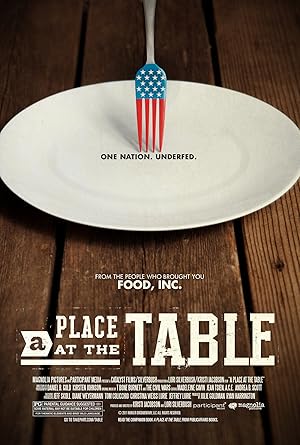
A Place at the Table Page #3
and what we subsidize
and what we don't.
# Look out, Ma, look out, Pa #
# Look at that horizon #
# Something's out there,
kicking up dust #
The subsidy system that we now have
actually started back in the 1930s
during the Great Depression.
Farmers were the first to be hit hard
when the economy went bad.
There was a lot of pressure to put
some sort of
government assistance forward
to help them get a decent price
at harvest time for their crops.
The programs
in the Great Depression,
of course,
were emergency programs.
The idea was, if we could,
on a temporary basis,
help support
the prices of farm products,
that we'd get
through this difficult period.
And then we would let
the market take over,
except we never let
the market take over.
# It's been a long time coming #
In the 1930s and '40s
and into the '50s,
and even a little bit beyond that,
I think you could make the case
that it really was family farmers
who were mostly benefiting
from these programs.
But as the agricultural sector
became more concentrated
in terms of ownership
of the land resources,
more and more
of these operations
came to resemble agribusinesses
and not family farming operations.
# It's been #
# A long time coming #
# It's been #
# A long time #
The U.S. Department
of Agriculture, USDA,
Is one of the most diverse
and complex agencies
in the entire federal government.
It does everything
from international food trade
to the Forest Service,
to food safety,
to animal protection,
to, of course, farming programs,
and food and nutrition programs.
The U.S. Department of Agriculture
has increasingly become the domain
of support for mega-farms
and mega-farming corporations.
Most of that subsidy money,
about 70% of it,
has gone just
to 10% of those beneficiaries.
The biggest,
largest, best capitalized farms,
they're hauling
And so there
is this weird paradox
where welfare
for the poor is scorned,
but corporate welfare,
as it's known,
is sort of heartily endorsed.
We subsidize
the basic ingredients in processed foods.
We do not subsidize fruits,
vegetables, and whole grains,
because the producers tend
to be small producers.
They don't have
the kind of political clout
that the big commodity producers
of corn and soybeans
and wheat
that gets processed do.
These subsidies
made products very cheap,
and therefore made it profitable
for the food industry
to invest in the infrastructure
for processing those products
into the packaged goods
that we see on every counter,
that are really ubiquitous now
Translation
Translate and read this script in other languages:
Select another language:
- - Select -
- 简体中文 (Chinese - Simplified)
- 繁體中文 (Chinese - Traditional)
- Español (Spanish)
- Esperanto (Esperanto)
- 日本語 (Japanese)
- Português (Portuguese)
- Deutsch (German)
- العربية (Arabic)
- Français (French)
- Русский (Russian)
- ಕನ್ನಡ (Kannada)
- 한국어 (Korean)
- עברית (Hebrew)
- Gaeilge (Irish)
- Українська (Ukrainian)
- اردو (Urdu)
- Magyar (Hungarian)
- मानक हिन्दी (Hindi)
- Indonesia (Indonesian)
- Italiano (Italian)
- தமிழ் (Tamil)
- Türkçe (Turkish)
- తెలుగు (Telugu)
- ภาษาไทย (Thai)
- Tiếng Việt (Vietnamese)
- Čeština (Czech)
- Polski (Polish)
- Bahasa Indonesia (Indonesian)
- Românește (Romanian)
- Nederlands (Dutch)
- Ελληνικά (Greek)
- Latinum (Latin)
- Svenska (Swedish)
- Dansk (Danish)
- Suomi (Finnish)
- فارسی (Persian)
- ייִדיש (Yiddish)
- հայերեն (Armenian)
- Norsk (Norwegian)
- English (English)
Citation
Use the citation below to add this screenplay to your bibliography:
Style:MLAChicagoAPA
"A Place at the Table" Scripts.com. STANDS4 LLC, 2024. Web. 7 May 2024. <https://www.scripts.com/script/a_place_at_the_table_1996>.


Discuss this script with the community:
Report Comment
We're doing our best to make sure our content is useful, accurate and safe.
If by any chance you spot an inappropriate comment while navigating through our website please use this form to let us know, and we'll take care of it shortly.
Attachment
You need to be logged in to favorite.
Log In